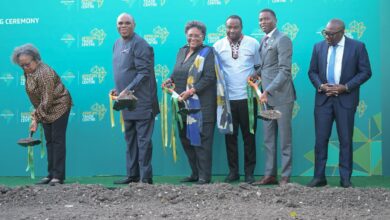World Leaders Summit Dialogue on Inequality: Is the COVID-19 crisis really a game changer?
Question posed: Which support instruments fall short to address the particular challenges faced by small island developing states? And how can we change these to help national and regional recovery and build resilience for the future?
Response:

I am more than pleased to be here today: UNCTAD XV being hosted by the Government of Barbados – the first time by a small state, by a small island developing state and by a Member of the Caribbean Community – I am more than pleased. I am truly proud.
This meeting provides an opportunity to highlight to the global community the issues and concerns of our grouping – the Small Island and Low-lying Coastal Developing States (SIDS) – and to identify some of the measures that can be taken by the international community to support our efforts to build resilience and promote sustainable development.
SIDS experienced GDP contraction in 2020 at about three times the global rate. The devastation caused to the health systems and to economic activity meant that at exactly the time that we needed to be able to address the health emergency, our economies and public finances contracted sharply. So we did the best we could. We applied funds that were budgeted for other purposes to meet the needs of the health sector for PPEs, medical equipment, testing supplies and vaccines. We shifted funds to meet basic social safety nets. We repurposed loans and borrowed additional funds. Already high debt burdens grew even higher.
What has been the response of the international community so far to this ongoing economic, public debt and liquidity crisis?
The G-20 Debt Service Suspension Initiative (DSSI) which allowed developing countries to temporarily suspend debt service payments to their official bilateral creditors is set to expire in December 2021. While this program had potential, it does not cover all middle to high income developing countries, many of which are SIDS and it also does not include private creditors both of which severely limit its potential.
Forty percent of developing countries received a credit downgrade during 2020. Furthermore, the new debt arising from the need to address the COVID-19 crisis together with the existing debt stock will continue to appropriate a significant proportion of public resources in debt repayments, while strangling critical infrastructural public investments required for economic rehabilitation.
An effective response to this situation must include significant and broad debt reduction for all developing countries, including vulnerable middle to high income states. Debt reduction should specifically address debts built up due to COVID-19 expenditures and climate change adaptation.
Many SIDS can no longer access multilateral and bilateral concessional aid/ financing because of their relatively high per capita income status. With the reality of our vulnerabilities exposed by the Covid and Climate crises, the call for a more appropriate basis for determining access to concessional financing takes on great urgency. We have to continue to press for the continued development and acceptance of the Multi-Dimensional Vulnerability Index (MVI). The issue of access to concessional resources for development financing and resilience building remains a significant priority for CARICOM States, indeed, for all SIDS.
We therefore call on the UN system, to intensify collaboration with relevant regional institutions, particularly in the Caribbean, the Pacific and the Indian Ocean, in order to make this index a reality. Additionally, we call on the IMF, the World Bank, as well as bilateral and multilateral development partners to step away from the blinders of GDP per capita and apply what we learn in Development Economics 101- that GDP per capita cannot be a measure of development, let alone sustainable development.
Resource mobilisation for rehabilitation, adaptation and building resilience remains a priority for CARICOM. The new IMF SDR allocation of US$ 650 Billion is a step towards providing additional liquidity to the global financial system. CARICOM Member States are likely to receive about US$ 1.7 Billion, which is about one-third of the funding-boost initially projected for the recovery of CARICOM States.
The call by the IMF Managing Director for countries with strong external positions to channel some of their SDRs to countries which need them most; the pledges already made to expand the resources under the IMF’s Poverty Reduction and Growth Trust; the proposals to channel SDRs to support structural transformation in vulnerable countries, either through the establishment of a new Resilience and Sustainability Trust or through the multilateral development banks are all welcome.
However, until new options are developed, multilateral support is on the basis of the same traditional policy menu and funding instruments that have been used to handle economic imbalances in the past. That policy menu does not adequately address our inherent vulnerabilities and fragilities. That policy menu will certainly be inadequate as the foundation for the design of recovery models that can build transformative and resilient economies in the face of global climate change.
As we prepare for COP26, we welcome the recent re-engagement of major players and the commitments to meaningful reduction of CO2 emissions. It is vital that these be honoured, in order to limit global warming to 1.5 C. For SIDS like us in the CARICOM, 1.5 to stay alive is more than a catchy slogan, it is an existential reality.
Successfully addressing our acute vulnerabilities will require SIDS to continue to strengthen technical, financial and institutional capacity to adapt to environmental and economic shocks caused by climate change. Pledges to the Green Climate and the Adaptation Funds must be honoured and, indeed, increased in order to ensure that the most vulnerable can adapt and survive. Procedures for access to these funds also need to be simplified.
We therefore have to be focused on pushing COP26 to be decisive in order to keep the pathways to achieving the goals of the Paris Agreement alive and translating commitments to real action on the ground.
COVID-19 is indeed a gamechanger, but the policy landscape for building resilient economies demands a willingness to think differently and requires innovative and transformative actions to address global inequalities and drive inclusive growth.
Also see video:






